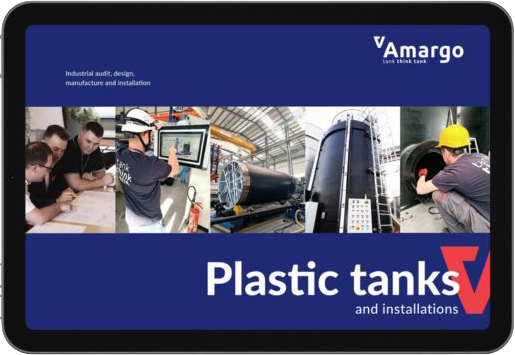Chemical-resistant systems for aquaculture: tanks and installations
In response to the dynamic growth of the Norwegian fish‑farming sector (both recirculating aquaculture systems – RAS – and flow‑through solutions), Amargo® offers comprehensive tank and installation systems made from chemical‑resistant plastics.
We deliver complete installations: from concept and design through production and prefabrication to assembly, commissioning and service.
Amargo® solutions for aquaculture provide reliability, safety and full compliance with strict environmental and technical standards.

Cost calculation for a chemical-resistant tank and installation
Send an inquiry to receive a quote for the tank and installation.
Chemical and dosing systems for fish farms: from product receipt to dosing
Our speciality is the design and implementation of complete systems for the storage and dosing of chemicals such as NaOH, HCl, H₂O₂, H₂SO₄, etc.
Scope of production, supply and installation
- Chemical‑resistant storage tanks (free‑standing or with catch basins).
- Tanks/systems for preparing diluted agents (dilution systems) or preparing agents from a solid form (e.g. NaOH flakes/granules).
- Filling cabinets – heated and thermally insulated unloading cabinets for tankers equipped with alarm systems (visual and audible) visible to operators outside the facility.
- Dosing cabinets – cabinets for dosing to individual receiving systems with dosing pumps, pressure dampers, constant‑pressure valves, safety valves and other protective fittings, with safety covers.
- Connecting and transfer pipelines for the entire system (HDPE, GRP, PVC‑C) – from receiving the agent from the road tanker through storage in tanks (usually placed together in a common catch basin if several tanks are installed, or a tank with an integrated basin) and further connection to dosing cabinets (dosing panels) to the distribution pipelines feeding individual lines/receivers across the farm.
- Control systems (control cabinets – electric cabinets) and cabling to integrate all elements into a single system, providing controlled operation of the entire farm infrastructure.
Expand and find out more about these control systems
SCADA (Supervisory Control and Data Acquisition) is an advanced information system for supervising and managing technological processes. It enables efficient control of industrial infrastructure by collecting, processing and visualising data from automation devices.
Integration of control cabinets with the overall farm‑ or facility‑wide management system
Control cabinets are integrated with the master system (e.g. SCADA) to provide full, two‑way communication. This enables transmission of control signals and receipt of diagnostic and operational data in real time.
The dosing system automatically adjusts pump performance based on the demand signal for the medium. This is achieved by using a control system with a frequency converter, which regulates pump speed according to current demand at the points of use.
At the same time, information is sent to the SCADA system about:
- the level of medium in the tanks,
- the operating status of equipment,
- the status of leak detection sensors,
- alarm level exceedances (e.g. MAX level),
allowing remote monitoring from the facility’s central control room.
- Heating systems and thermal insulation (e.g. for concentrated sodium hydroxide 50 % to eliminate the risk of crystallisation of the medium).
- Vapour cleaning systems, including water traps.
- Additional equipment – e.g. ladders, railings, platforms, working platforms, safety gates.

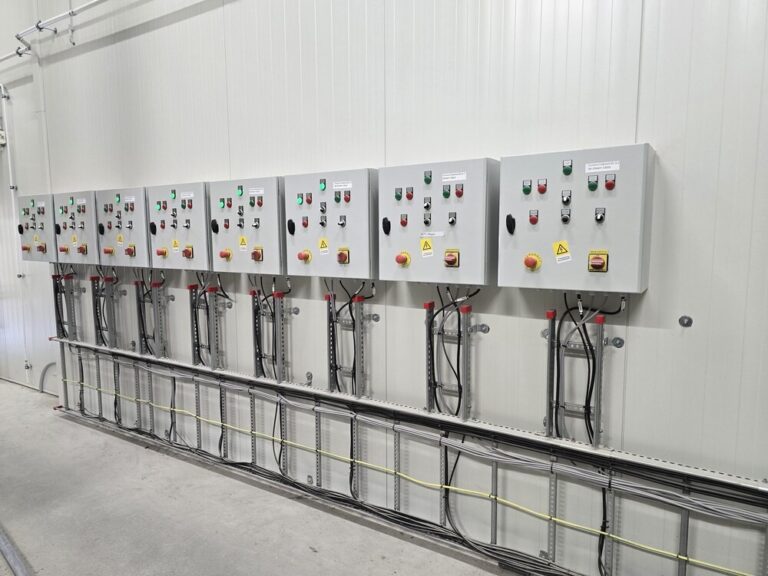
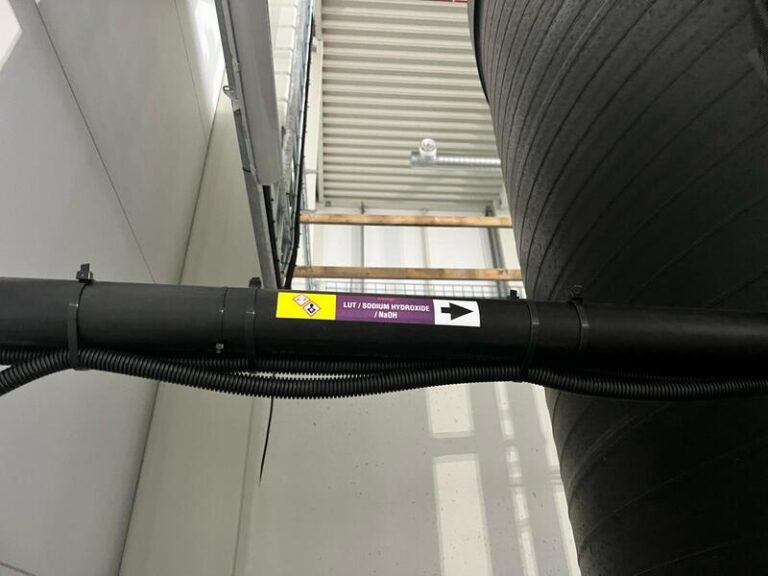
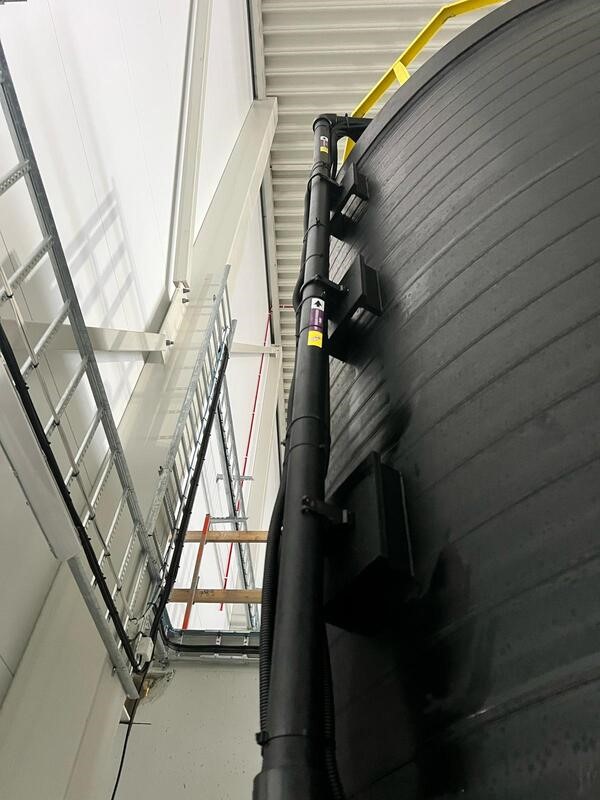
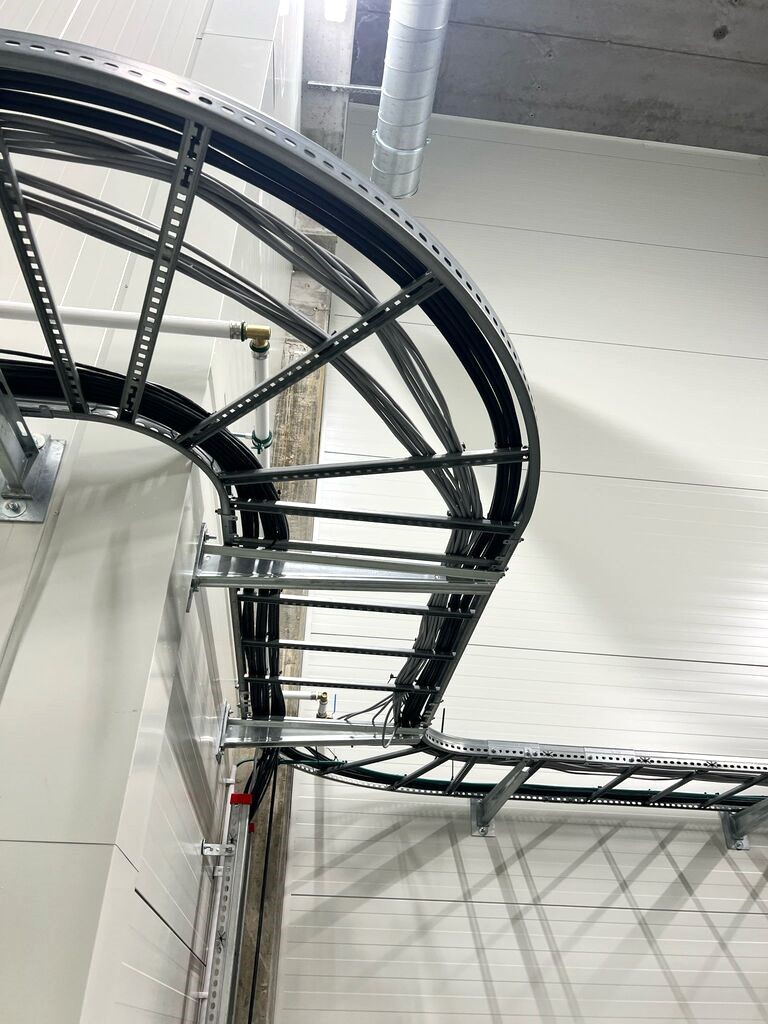
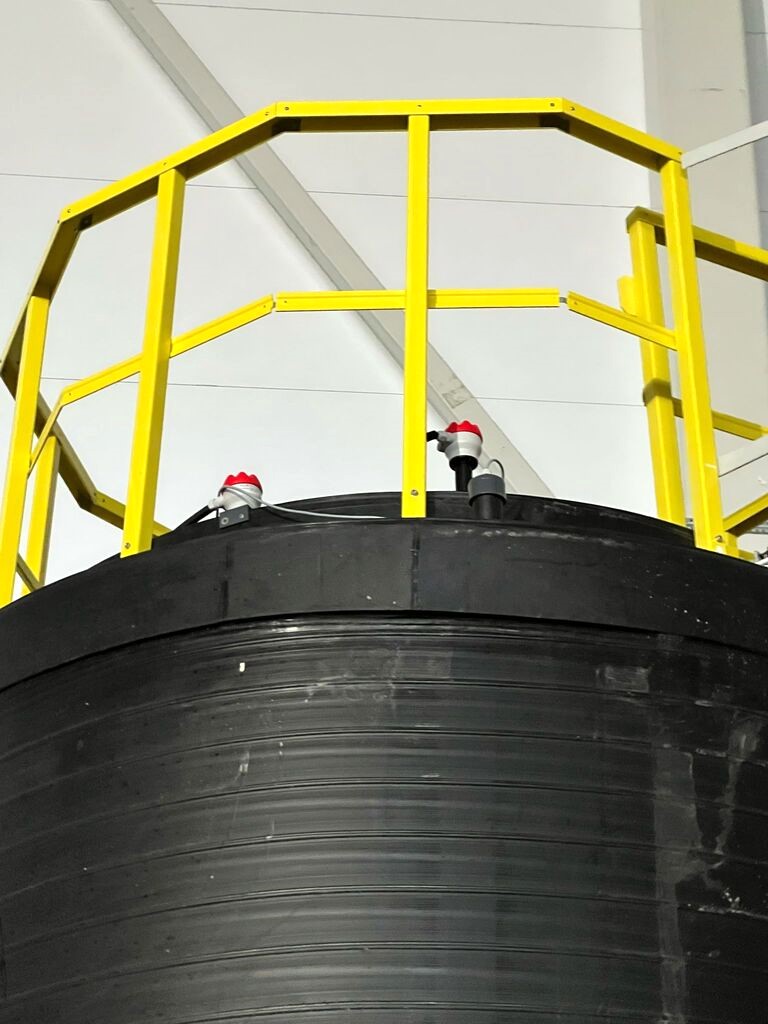
Specialised equipment, components, devices and instrumentation for RAS and flow‑through systems
We manufacture specialised components from non‑corrosive, chemical‑resistant material (e.g. HDPE PE100/PE100 RC plastic or GRP/TWS composites plus stainless‑steel components) that are used in modern fish farms, including for:
- Center sieve – separator pipes for fish or impurities with adjustment for dead‑fish separation systems.
- Jetting pipes – inflow pipes with nozzles (with the option of setting angle/direction) that put water into motion and support fish activity.
- Dead‑fish boxes – technological tanks (separation) and storage tanks for dead fish and production waste.
- Walkways, platforms, railings and ladders – made from anti‑corrosion materials.
- Elements made from fibreglass with resin or from thermoplastics that form parts of water supply and discharge systems as well as aeration of process water and purification of air from CO₂.
- Chambers and ventilation ducts, deodorisation conduits and scrubbers, components used to purify air released to the atmosphere.
- Technological mixers, selected for specific operating parameters, or mixing/circulation installations.
Our components are manufactured using high‑class machines and tools at the Amargo® production facility:
- horizontal CNC processing of flat elements,
- vertical CNC milling machines,
- linear butt welding,
- butt welding at 90°,
- hot bending,
- extrusion and hot‑gas welding,
- extruded stress‑free technology for cylinders and tanks,
- composite technology – manual and machine.
We provide completion and integration of the above components with other materials such as stainless/acid‑resistant steel, which ensures very high precision and repeatability. This results in fully functional assemblies that perform specific technical functions within the entire system.
Having a single supplier deliver the whole solution guarantees full material compatibility, precise matching and adherence to required tolerances. Integrating different technologies and materials with different properties eliminates the risk of assembly and technical errors, shortens the time needed to complete the investment and significantly reduces execution risks.
Who do we work with?
General contractors of farms equipped with RAS and flow‑through systems, responsible for the execution of complete installations or their key parts (chemical, water and technological systems).
Process engineers and designers seeking partners who will not only supply a tank but also help solve technical problems, assist with selecting parameters and modelling the storage tank with its accompanying installation, and advise on connecting all sub‑assemblies (individual blocks) into an optimally operating system.
Fish farm operators who need reliable solutions that minimise environmental and production risk, and service teams that ensure continuous operation and reliability of the installation.
Suppliers of chemicals, particularly in settlement models based solely on actual consumption of the medium.
Benefits for general contractors and investors
We take responsibility for the entire system: from concept through design (including selection, parameter verification, static calculations, modelling) to installation and service.
A comprehensive approach allows for individual tailoring and flexibility and reduces errors and critical points (lower risk, less cross‑discipline co‑ordination).
Systems of tanks and installations are created based on analyses and data from a specific farm or plant defined by the client. Thanks to our own production and quality control we ensure durability and reliability of our constructions.
Our systems are designed to provide full compatibility, reliability and on‑time delivery of every project, minimising risk and maximising efficiency.
Working together based on competencies
The client, as an entity with industry knowledge and experience in fish farming and water treatment technologies, precisely defines the technological requirements: where, when, in what quantity and of which chemical is needed.
Amargo® neither possesses nor aspires to possess biological/process competencies in aquaculture. Our task is the technical implementation of the assumptions presented by industry specialists.
Based on the process data received, functional requirements or a description of the goal, we design complete systems: from reception units through storage to precise dosing of media. We develop execution documentation, manufacture installation components and carry out their assembly at the destination.
This includes both thermoplastic and composite components and the work associated with their processing, i.e. cutting, welding, butt‑welding, milling, in accordance with the technological and quality requirements of the project.
Comprehensiveness – full support from concept to commissioning
We are among the few on the market who offer the full value chain: from consultancy and preliminary concepts, through design (including cross‑discipline, covering electricity, power supply and control systems) with modelling, to production, logistics, installation and commissioning of the system. This comprehensiveness is one of our key values.
We know that clients do not necessarily have expertise in thermoplastics or composites technology. Therefore we are a partner and advisor at every stage.
In addition, we professionally and cost‑effectively model and simulate entire systems, and organise transportation, safeguarding and customs clearance.
We guide the client through the entire process professionally and are available 24/7.
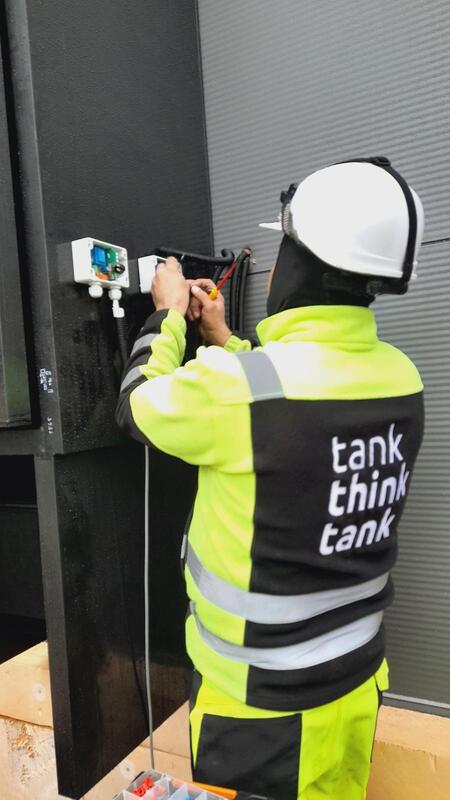
Durability, reliability and adaptation to any farm
Our aquaculture solutions are made exclusively from certified chemical‑resistant materials (thermoplastics and composites). This guarantees longevity, resistance to aggressive environments and full operational reliability.
We use regranulate additives, follow ecodesign principles and select materials and plastics with a low carbon footprint and minimal environmental impact. We conduct R&D on zero‑emission materials, striving for full environmental responsibility at every stage of the product life cycle.
Thanks to an advanced machine park and modern and flexible production technologies (winding lines for thermoplastics and composites and a CNC machine‑tool park plus a robotised station) we are able to precisely adapt each element of the installation to the individual needs of a specific fish farm, regardless of its scale, configuration or local technical conditions.
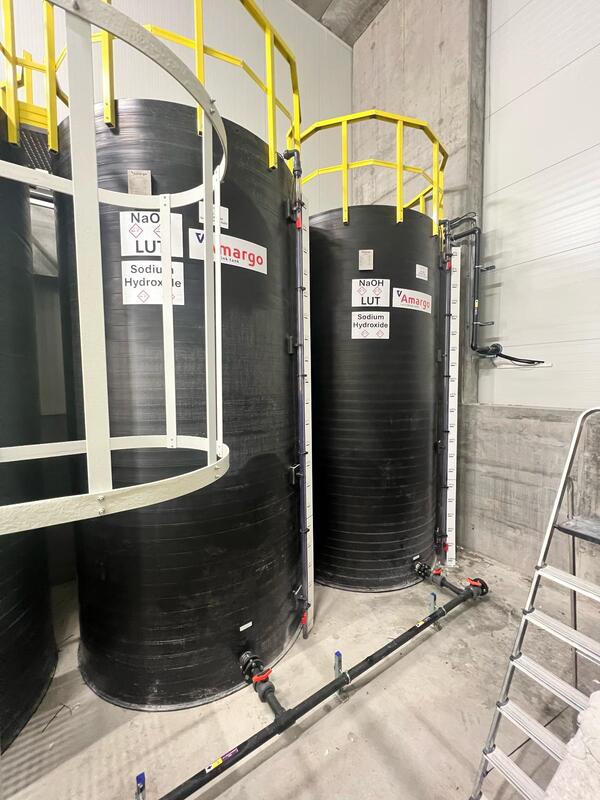
Innovative weld quality indicators in tanks
We were the first on the market to implement so‑called indicator elements in our regulated tanks for corrosive, toxic and hazardous substances. This innovative solution makes it possible to continuously assess the technical condition of the structural material. The indicators allow for simple control of the degree of degradation of the plastic in critical points, which significantly facilitates inspection tests.
This enables reliable analysis of the condition of the tank and assessment of whether its service life can be safely extended beyond the original design time specified in the technical documentation. This practical solution increases operational safety and allows our clients to optimise costs by avoiding premature replacement of the chemical‑resistant tank.

Safety and automation of chemical‑resistant systems
Process safety and operational reliability are our priority. Therefore, we design our chemical‑resistant systems with full automation and integration with modern facility management infrastructure in mind.
We equip chemical‑resistant systems with measuring sensors, PLC controllers, alarm systems and modules enabling seamless integration with existing BMS or SCADA solutions.
Thanks to this, the user has constant access to data, can remotely monitor operating parameters, react quickly to irregularities and manage the process effectively. Everything with the highest level of safety and operational efficiency.
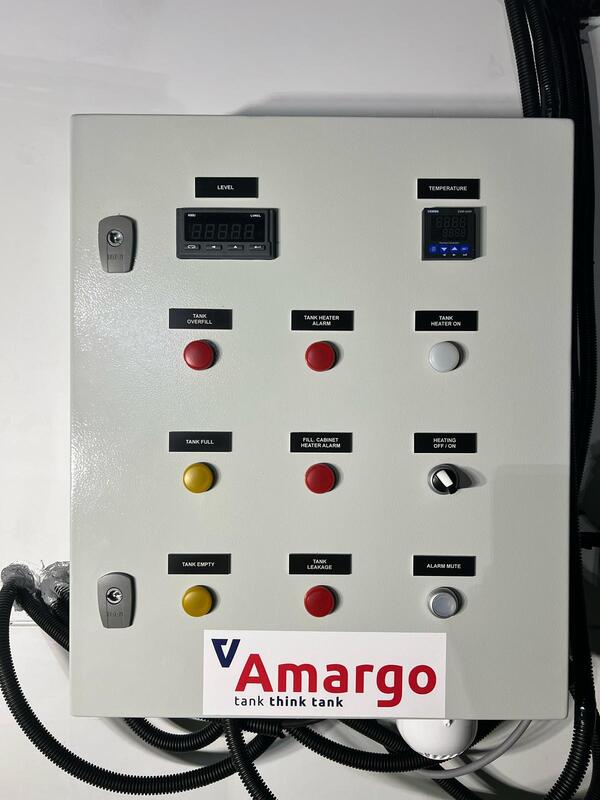
Transparent and legal operation regardless of the country in which we implement the project
Our cooperation approach is based on full transparency and compliance with local law, whether we carry out projects in Poland, Norway or another European country. As a company with numerous projects in Norway, we have a registered Amargo® branch in that country with a NUF tax number, which allows us to operate in accordance with local law.
We ensure full respect for workers’ rights. Our specialists work under legal conditions, with appropriate insurance, registration with Norwegian authorities and in accordance with applicable employment and occupational safety regulations. Therefore working with us is safe, predictable and compliant with applicable regulations, without risk for the investor.
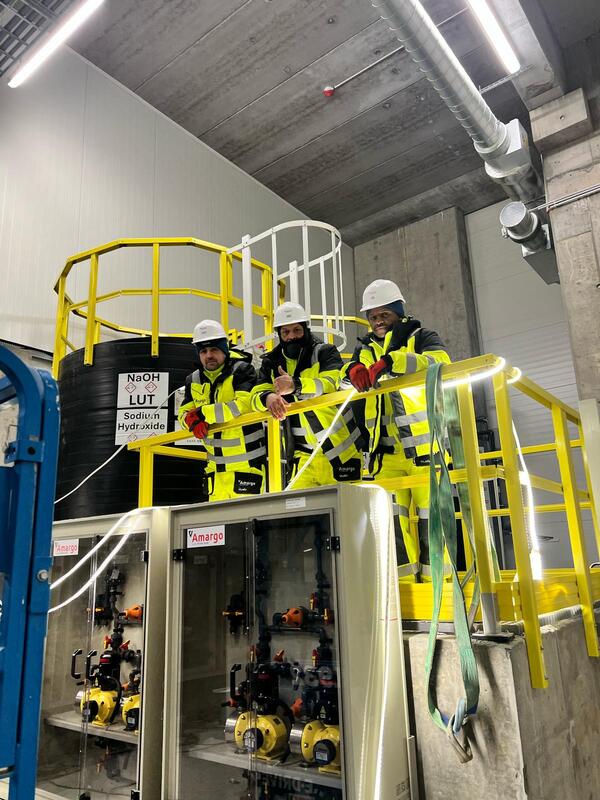
Cost calculation for a chemical-resistant tank and installation
Send an inquiry to receive a quote for the tank and installation.
Investments in chemical storage and dosing systems for aquaculture – from concept to implementation
We offer a full range of services, starting from needs analysis and budget development, through precise design (including pre‑design) and system modelling to execution design, production and completion of all system elements.
We also handle comprehensive logistics, including securing and packaging, loading, transport with appropriately sized vehicles/trucks, customs clearance, installation, commissioning, testing and staff training, providing comprehensive after‑sales service.
Our approach ensures optimisation of processes, risk minimisation and full control over storage and dosing of chemical substances, which is crucial for maintaining the highest standards of quality and safety in such a demanding industry as aquaculture.
As part of the investment we provide:
- safety for employees and the environment by manufacturing systems dedicated to storing and dosing even strongly oxidising media such as sodium hypochlorite or sulfuric acid,
- compliance with Scandinavian regulations,
- reliability and continuity of operation of the chemical‑resistant system,
- operational efficiency through optimisation of dosing and storage of chemicals resulting in cost savings and improved production quality,
- flexibility and scalability – solutions are tailored to the changing needs of farms and plants, allowing easy expansions and modernisations.
With an understanding of the specifics of aquaculture and the requirements of the Scandinavian market, we deliver solutions that not only protect our clients’ investments but also support sustainable development of the industry and the protection of valuable natural resources.
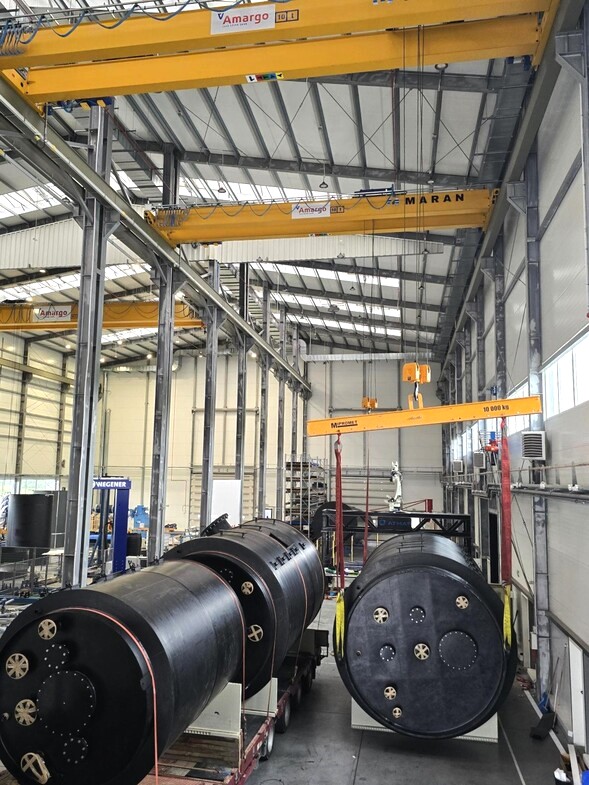
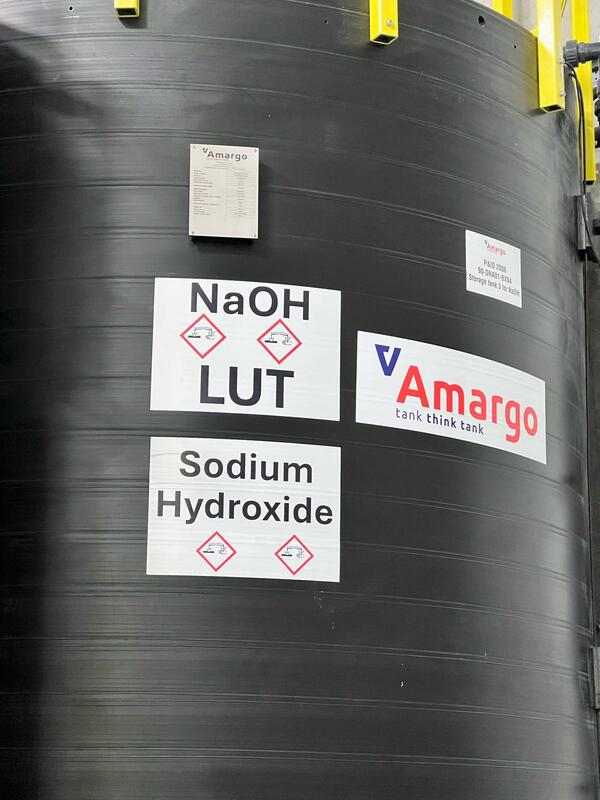

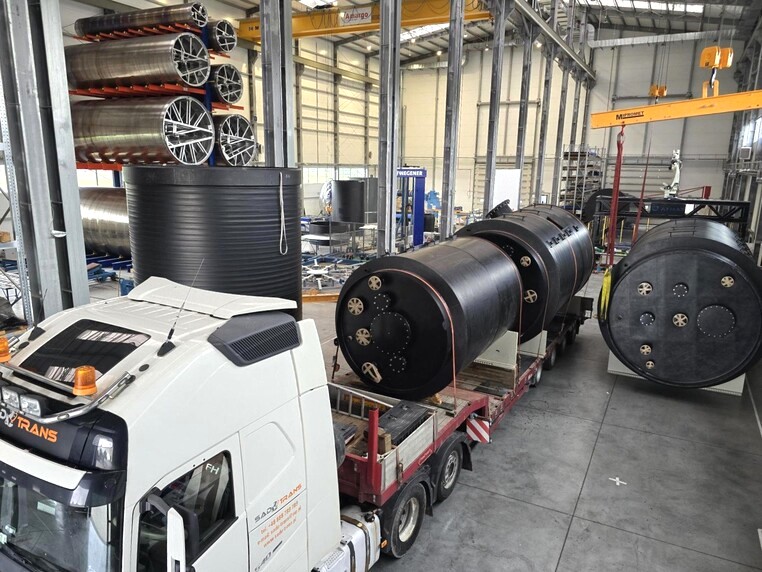
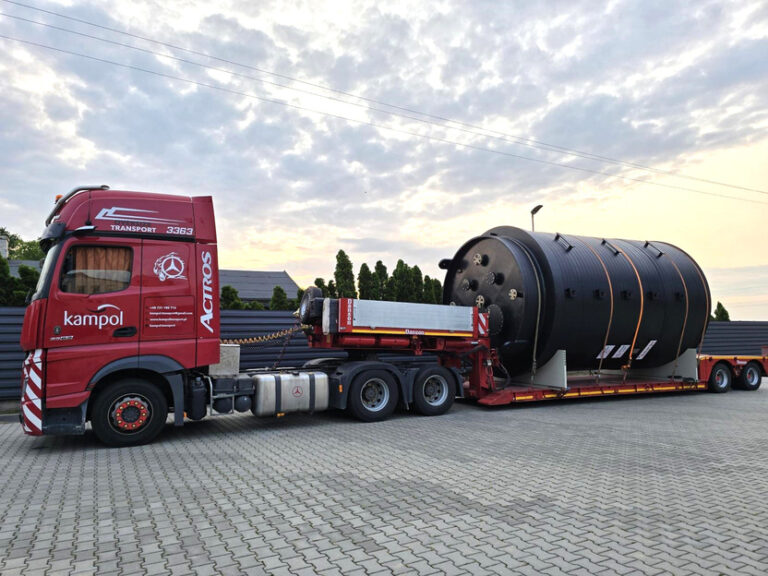
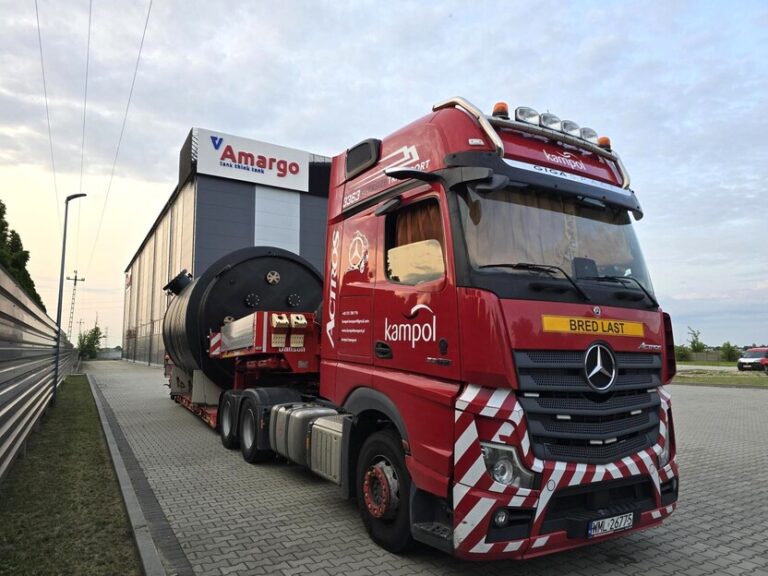
Use of tanks and industrial installations in aquaculture
The aquaculture industry requires solutions of the highest technical standard, compliant with the idea of sustainable development. To maintain an advantage, it must offer a product of the highest quality, safe and attractive to consumers in demanding markets. Clients expect not only healthy, fresh fish – products free from antibiotics and toxins – but also responsible and ethical farming.
A key factor enabling the large‑scale growth of this industry is the use of modern technological solutions, including advanced industrial tanks adapted to the specifics of aquaculture.
Industrial tanks used in aquaculture must therefore meet stringent environmental and sanitary standards.
For the aquaculture sector we offer tanks for strong bases or acids along with installations.
EXPAND THE QUESTIONS BELOW TO LEARN MORE
For what purpose does the aquaculture industry use tanks and installations for strong bases and acids?
First and foremost to correct pH in water and wastewater treatment plants, e.g. in recirculation systems where the quality of treated water is crucial. CO₂ reduction using NaOH and CIP systems for disinfecting installations, for example in fish processing plants, are also used.
Strong chemicals can also be used to hygienise waste such as entrails and dead fish until they are collected and further processed.
Another area of application is tanks for PIX/PAX and polyelectrolytes, i.e. chemical substances used to precipitate sludge in recirculation systems. This particularly applies to companies supplying technologies for wastewater treatment plants.
Another application is the disinfection of sludge resulting from precipitation and dewatering in thickeners in sewage treatment plants on fish farms with recirculation systems (e.g. by liming or using another reagent).
What role do tanks play in modern fish farming?
In response to increasing demand for sustainable food and efficient production systems, the aquaculture industry in Norway increasingly invests in closed recirculation systems that enable full control over the fish life cycle. In these systems industrial tanks are a key element of the infrastructure, allowing significant reduction of water consumption, optimisation of farming conditions and increased biological security.
Proper selection, design and operation of tanks have a direct impact on efficiency, farming quality and compliance with environmental standards. In an era of growing competition and societal expectations of sustainable development, investment in modern tanks forms the basis for the long‑term success of companies in the aquaculture sector.
Tanks for chemical substances in fish farming play a very important role in ensuring fish health, the stability of the aquatic environment and the operational safety of the company.
High‑quality tanks made from corrosion‑resistant materials, such as plastics (polyethylene PE, polypropylene PP), composites and stainless steel, provide not only durability but also biological safety and ease of maintaining hygiene.
Corrosion‑resistant tanks are used to store corrosive, toxic and hazardous substances as well as non‑aggressive substances that are essential in the farming process. These include:
- disinfectants (e.g. sodium hypochlorite),
- water treatment agents (e.g. calcium sulfate, sodium carbonate),
- pH regulators.
Thanks to dedicated installation elements, the tanks allow controlled, safe dosing of chemicals into the entire system to:
- maintain stable physico‑chemical parameters of water,
- combat diseases,
- improve fish condition.
Properly designed tanks (i.e. equipped with catch‑basins and overflow sensors) prevent:
- leaks into the soil and groundwater,
- contamination of farming water by uncontrolled release of substances.
Storing the working medium in a large‑capacity tank allows:
- reduction of delivery frequency,
- improved safety and organisation of work in the farming enterprise.
Compliance with regulations regarding the storage of chemicals (e.g. ADR, REACH) allows the avoidance of penalties and legal sanctions.
What support does Amargo® offer to ensure the reliability and efficiency of chemical‑resistant systems?
We look at the entire chemical‑resistant system from a bird’s‑eye view. We advise in a multi‑faceted way, always from the user’s perspective, as if we were the ones operating the entire system later.
As part of the investment, we analyse the project in terms of feasibility. This means, among other things, that we check for collisions, adjust the tank to the floor and assess transportation possibilities (for example whether the elements will pass through the gate). We select appropriate equipment and ventilation systems, and design control, both local and remote. Planning also includes vapour extraction and other key technical aspects.
We also advise on the selection of the capacity of membrane dosing pumps so that they operate optimally across the full range, with smooth speed regulation by frequency converters and without the risk of overheating at extremely low outputs.
Additionally we help optimise transfer and reception installations, proposing, for example, replacing costly and failure‑prone heated pipelines with effective sodium hydroxide dilution systems, which translates into lower investment and operating costs.
Sustainable development and ecology
In our operations we follow the principles of the Circular Economy, ensuring that every stage (from design to disposal) minimises environmental impact. We use materials that can be recycled, and we recycle or reuse production waste. This reduces consumption of primary raw materials and lowers the carbon footprint of our products. Our approach is not only environmental responsibility but also tangible added value for investors who appreciate partners acting in accordance with the idea of sustainable development.
Ready to develop cooperation in Scandinavia
Our installations are already operating at satisfied clients in the Scandinavian market as complete chemical, water and technological systems supporting the infrastructure of fish farms.
If you are responsible for designing, building or daily operation of a fish farm, let’s talk. We will help with:
- selection and design of the storage and dosing system for substances with equipment (sensors, pumps, ladders, mixers, valves, controllers, cabinets, pipes, supports, etc.),
- feasibility analysis and budgeting,
- prefabrication and international logistics,
- installation and commissioning of the system,
- staff training and service.
In line with the requirements of the Scandinavian market
In the dynamically developing aquaculture sector, safety and reliability of chemical storage systems such as NaOH, HCl, H₂O₂ or H₂SO₄ are absolutely essential.
Our solutions are designed and manufactured in accordance with the requirements of the Scandinavian market, where the highest standards of environmental protection, operational efficiency and compliance with local regulations and safety standards are crucial.
*The data administrator is AMARGO sp. z o. o. sp. k. with its registered office in Koprki, ul. Jaśminowa 16, 05-850 Ożarów Mazowiecki, e-mail address: ado@amargo.pl. The data provided in the above form will be processed in order to send the file with the Amargo guide, due to the legitimate interest of the administrator in responding to the submitted request. If you wish, the e-mail address will also be processed for the purpose of delivering the newsletter, i.e. providing the ordered service. You have certain rights regarding the processed personal data, i.e. access, rectification, deletion, restriction, transfer, objection to processing, and lodging a complaint to the appropriate authority (President of the Personal Data Protection Office, ul. Stawki 2, 00-193 Warsaw) . Providing data is voluntary, but necessary to fulfill a specific purpose. More information about the processing of personal data is included in the Privacy Policy (only in Polish).


